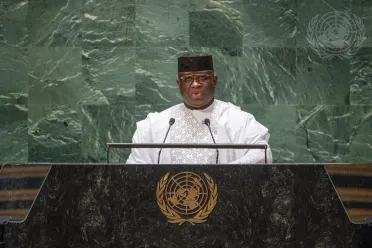Statement
Statement summary
JULIUS MAADA BIO, President of Sierra Leone, said that his country’s policy direction resonates with this year’s General Assembly theme of rebuilding trust and reigniting global solidarity. Providing an overview of his Government’s achievements in his first five-year term, he cited fighting corruption, abolishing the death penalty, increasing education funding by 22 per cent and providing tuition-free access to all school age children at the primary and secondary levels. He further highlighted his Government’s action on gender issues, with its commitment to and recognition of 18 November as the World Day for the Prevention of and Healing from Child Sexual Exploitation, Abuse and Violence. Under the Gender Equality and Women’s Empowerment Act of 2022, 30 per cent of elected and appointed seats are compulsorily slated for Sierra Leonean women. He further gave a forecast of his five-pillar-based second term to cover food security, human capital development, youth empowerment, technological advancement and public service reform.
Calling on Member States to uphold the United Nations Charter in order to foster international cooperation and urging accelerated action on the Sustainable Development Goals, he stated that “the 2030 Agenda for Sustainable Development isn't merely an outline; it is a solemn pact we've entered, committing to crafting a world steeped in peace and prosperity”. He spotlighted the rising spate of insecurity and coups in the Economic Community of West African States (ECOWAS) sub-region and joined his voice to regional and international calls against illegitimate changes in Governments of the region, stressing that “while we emphasize the importance of dialogue, we can't ignore a crucial reality: the ongoing threats to our Continent's constitutional stability are signs of deeper problems”. He proffered educational and human capital development measures such as job creation, poverty alleviation and government industry support as tools to successfully combat the current state of things.
Echoing the unequivocal dissent of ECOWAS towards any extra-constitutional changes of Government, he said they “threaten the stability of individual nations and the fabric of our collective African identity”. Ongoing threats to the continent's constitutional stability are signs of deeper problems, ranging from past and present injustices to the burdens of poverty, widespread unemployment and discrimination. “Our duty is clear: We must lift our people from poverty,” he said. “Together, we must envision an Africa where our Governments are not removed by unconstitutional means — not because they forcefully prevent them, but because the underlying causes for such challenges no longer exist”. He instituted a National Electoral Systems Review Committee to address historic challenges to his country’s electoral process and strengthen electoral integrity. He regretted a certain Member State’s introduction of unilateral coercive measures, including visa restrictions, on some Sierra Leonean citizens in the aftermath of the 24 June multi-tier elections. Member States must respect the sovereignty and political independence of one another, he stressed, urging dialogue and open channels of communication on all matters.
As Sierra Leone assumes a non-permanent seat for the Security Council’s 2024-2025 session after 53 years, he expressed its commitment to upholding international peace and security, with a bias for insecurity and democratic governance ideals in West Africa and the Sahel, stating that “our goal remains to thwart the seeds of conflict before they sprout, to ensure sustainable resources for African Union-led peace operations and to silence the guns decisively and forever in Africa”. He also called for reforming the Council, particularly echoing Africa’s demands for two permanent and five non-permanent seats. He requested equitable, timely access for Sierra Leone on climate financing and concluded by calling for global solidarity in confronting the issues of our day, with special attention on the triple planetary crises of pollution, climate change, and biodiversity loss. “The multifaceted crises challenging our global community demand unified action. For our collective strength is determined by our most vulnerable segments,” he stressed.
President Julius Maada Bio of Sierra Leone highlighted his country’s commitment to democratic governance and human rights, as well as the primacy of regional peace, particularly within the context of the West African subregion.
“Sierra Leone raises its voice alongside our ECOWAS community, expressing unequivocal dissent towards any extra-constitutional changes of Government,” he declared, noting that such actions imperil not only individual nations but also the “cohesive fabric of the broader African identity.”
The President’s message for cooperation and collaboration went beyond regional borders, calling for rebuilding trust and solidarity on the global stage.
Quoting Archbishop Desmond Tutu, “there comes a point where we need to stop just pulling people out of the river. We must go upstream and find out why they’re falling in,” President Bio urged world leaders to address the root causes of today’s problems.
“Our duty is clear: We must lift our people from poverty,” he said.
Full statement
Read the full statement, in PDF format.
Photo

Previous sessions
Access the statements from previous sessions.
